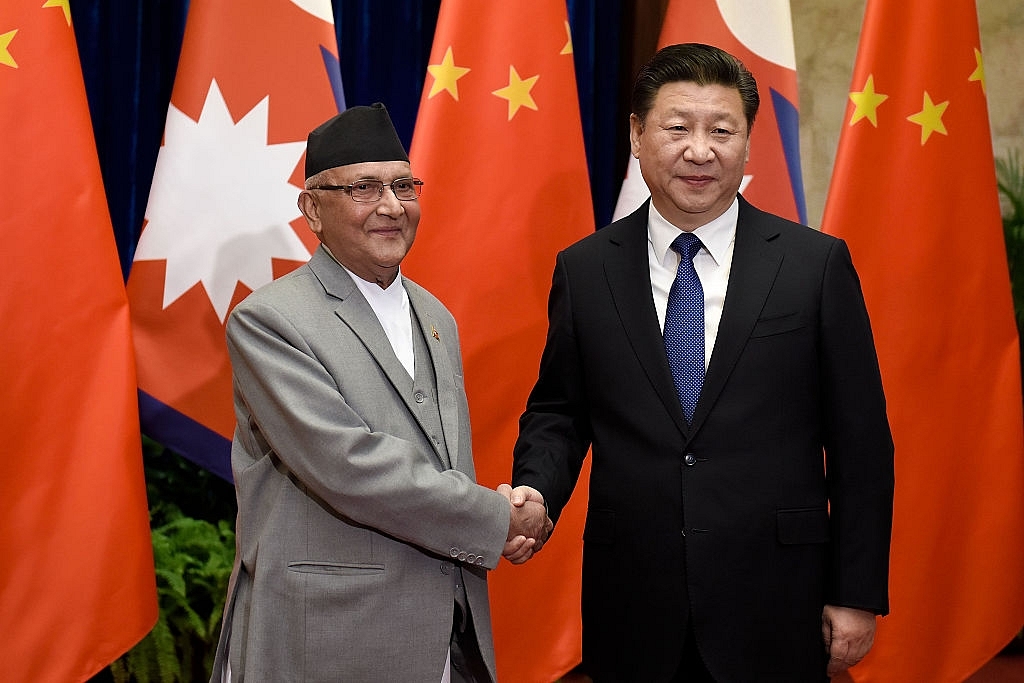World
Nepal Courts China As Oli Seeks To Reduce Indian Influence
- Oli also expressed vocal support for China’s Silk Road initiative, saying that it will greatly benefit Asia and the world.
- Nepal secured transit rights through China, thereby reducing Nepal’s dependence on India for global trade.
- Xi stressed upon mutual respect for each other’s sovereignty and called for non-interference in Nepal’s internal affairs.

Nepal’s KP Sharma Oli with Xi Jinping (Etienne Oliveau/Getty Images)
Nepali Prime Minister KP Sharma Oli met China’s President Xi Jinping on Monday, 21 March, as part of his week-long trip to China. This is Oli’s first visit to China as Prime Minister and comes a month after his state visit to India. The visit assumes added significance, given Nepal’s recent disagreements with India over its new constitution, which led to a blockade on the India-Nepal border last year.
In an interview to China’s Xinhua network ahead of his visit, Oli hoped that the visit would expand and deepen Nepal’s relationship with China. “To get support and goodwill from China is the main purpose of my visit,” the Prime Minister said.
Significantly, Oli also expressed vocal support for China’s Silk Road initiative, saying that it will greatly benefit Asia and the world. India has thus far been reticent in expressing its opinions on the project, and many Indian analysts believe that the initiative is part of a larger and less benign geopolitical strategy being employed by Beijing.
Nepal has been wary of India’s influence, after a blockade on the India-Nepal border last year threatened to cut off supply to vital commodities, including fuel. China later stepped in and supplied fuel to Nepal, in November last year. But Oli would be hoping to finalize a more permanent arrangement with China on his ongoing visit.
Oli also secured transit rights through China in an agreement which he signed with the Chinese Prime Minister Li Keqiang on Monday. The agreement would significantly reduce Nepal’s dependence on India by opening up trade routes through China. At present, 98 percent of Nepal’s third country trade goes through India and to the port of Kolkata, according to the Indian foreign ministry.
China has been keen on nurturing its relationship with Nepal, following Kathmandu’s fallout with New Delhi last year. In his meeting with Oli, President Xi Jinping stressed the commonalities between China and Nepal as developing countries “facing the historic missions of reform and development”. Echoing Oli’s comments that Nepal would stand to gain by engaging with China’s economy, Xi called for efforts to expedite the setting up of a China-Nepal free trade area and pitched for greater cooperation on connectivity, energy, post-earthquake reconstruction and industrial capacity.
In addition, Xi stressed upon mutual respect for each other’s sovereignty and called for non-interference in Nepal’s internal affairs. These comments are particularly significant, given that many in Nepal perceived India’s support to the Madhesis as undue interference in Nepal’s internal matters.
India has long enjoyed influence in Nepal, dating back to the 1950 Treaty of Peace and Friendship which established close strategic cooperation between the two countries, but Beijing’s growing influence in Nepal can’t be underestimated. At the South Asian Association for Regional Cooperation (SAARC) summit in Kathmandu in November 2014, China secured the support of leading Nepali politicians and diplomats in its bid to become a member of the regional grouping.
Even more notably, Nepal’s former Maoist Prime Minister Prachanda visited China last year, even as the blockade controversy raged on with India. “Nepal wants to be a good friend of India, not the yes man,” Prachanda had said at the time.
All of this suggests that China possesses a growing lobby of support within Nepal – with the border blockade only assisting in that growth. India might be in danger of losing a democratically elected government to Chinese influence in South Asia.
Introducing ElectionsHQ + 50 Ground Reports Project
The 2024 elections might seem easy to guess, but there are some important questions that shouldn't be missed.
Do freebies still sway voters? Do people prioritise infrastructure when voting? How will Punjab vote?
The answers to these questions provide great insights into where we, as a country, are headed in the years to come.
Swarajya is starting a project with an aim to do 50 solid ground stories and a smart commentary service on WhatsApp, a one-of-a-kind. We'd love your support during this election season.
Click below to contribute.
Latest